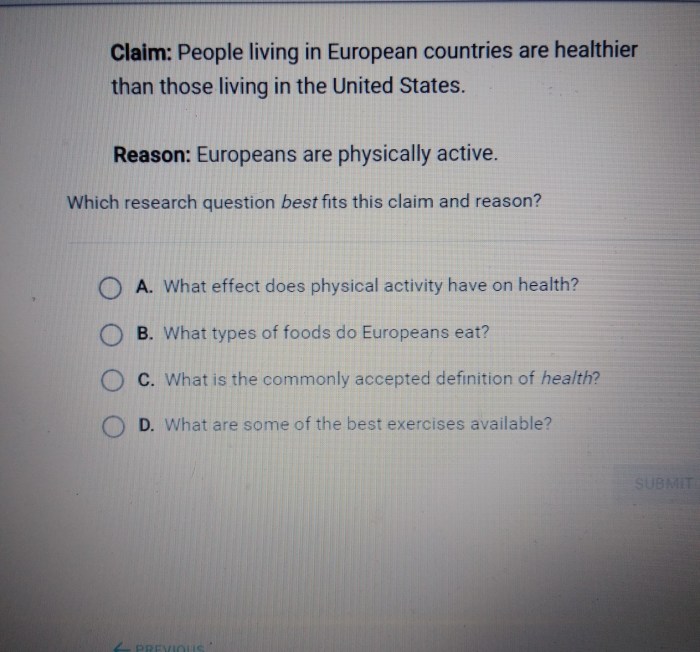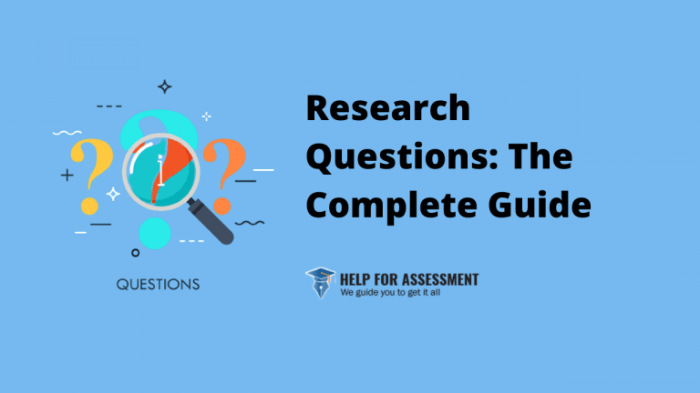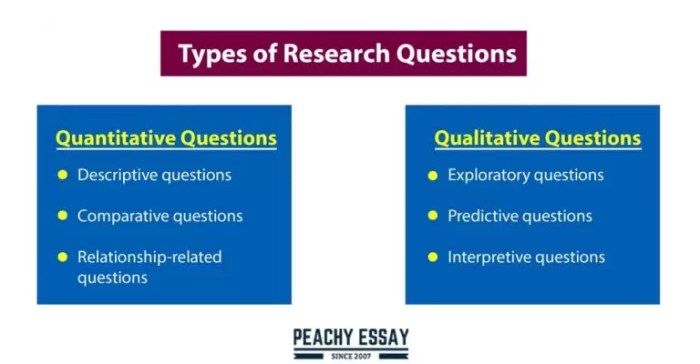In the realm of research, the selection of an appropriate research question is paramount. As we delve into the topic of “Which Research Question Best Fits This Claim and Reason?”, we embark on a journey that unveils the intricate relationship between claims, reasons, and the research questions that drive our investigations.
This comprehensive guide will navigate you through the essential elements of research question identification, claim and reason analysis, and the meticulous process of selecting the most suitable research question. By exploring the criteria and factors involved, you will gain the knowledge and skills to make informed decisions that lay the foundation for successful research endeavors.
Research Question Identification: Which Research Question Best Fits This Claim And Reason

Selecting an appropriate research question is crucial for successful research. It defines the scope, direction, and focus of the study. Well-formulated research questions are clear, concise, and feasible, guiding the researcher throughout the research process.
Examples of well-formulated research questions:
- What are the factors that influence consumer behavior towards eco-friendly products?
- How does online learning impact student engagement in STEM subjects?
Examples of poorly formulated research questions:
- Is marketing important?
- What is the impact of technology?
Criteria for evaluating research questions:
- Clarity: The question should be easily understood and unambiguous.
- Feasibility: The question should be achievable within the constraints of time, resources, and available data.
- Relevance: The question should address a significant research gap or contribute to existing knowledge.
Claim and Reason Analysis

A claim is a statement that asserts a position or makes an argument. A reason is the evidence or justification provided to support the claim.
Examples of claims and reasons:
- Claim:Social media has a negative impact on mental health. Reason:Social media can lead to feelings of isolation, anxiety, and depression.
- Claim:Climate change is caused by human activity. Reason:The burning of fossil fuels releases greenhouse gases, which trap heat in the atmosphere.
Strengths and weaknesses of claims and reasons:
- Strong claims:Clear, specific, and supported by evidence.
- Weak claims:Vague, general, or lacking evidence.
- Strong reasons:Relevant, credible, and sufficient to support the claim.
- Weak reasons:Irrelevant, anecdotal, or insufficient to support the claim.
Research Question Selection

Selecting a research question that best fits a given claim and reason involves considering the following factors:
- Research objectives:The research question should align with the overall goals of the study.
- Data availability:The research question should be answerable with the available data or resources.
Step-by-step guide to selecting an appropriate research question:
- Identify the claim and reason.
- Brainstorm potential research questions that address the claim and reason.
- Evaluate the potential research questions based on the criteria discussed above.
- Select the research question that best fits the claim and reason, and is feasible and relevant.
Research Question Evaluation

Once a research question has been selected, it is important to evaluate it to ensure its quality and appropriateness.
Criteria for evaluating research questions:
- Feasibility:The question should be achievable within the constraints of the study.
- Ethical considerations:The question should not violate ethical principles or harm participants.
- Clarity:The question should be clearly stated and unambiguous.
Examples of how to evaluate research questions and identify potential problems:
- Feasibility:Consider the availability of data, time, and resources needed to answer the question.
- Ethical considerations:Identify any potential risks or harms to participants and ensure that the study adheres to ethical guidelines.
- Clarity:Check if the question is clearly stated and specific, and if it avoids ambiguous or vague language.
Research Question Refinement
Refining a research question involves making it more specific and focused.
Techniques for refining research questions:
- Breaking down complex questions:Divide a broad question into smaller, more manageable parts.
- Identifying key variables:Determine the variables that are relevant to the research question.
Examples of how to refine research questions to improve their quality:
- Refined question:What is the impact of social media on the self-esteem of adolescent girls? Original question:How does social media affect mental health?
- Refined question:What is the relationship between sleep quality and academic performance in university students? Original question:How does sleep affect student success?
FAQ Overview
What is the significance of selecting an appropriate research question?
Selecting an appropriate research question is crucial as it sets the direction and scope of your research. It ensures that your investigation is focused, relevant, and has the potential to contribute to the advancement of knowledge.
How do I evaluate the quality of a research question?
To evaluate the quality of a research question, consider its clarity, feasibility, relevance, and ethical implications. Ensure that it is specific, measurable, achievable, relevant, and time-bound (SMART). Additionally, assess its potential impact and the availability of resources to conduct the research.
What factors should I consider when selecting a research question?
When selecting a research question, consider your research objectives, the available data, the resources at your disposal, and the potential impact of your findings. Align your question with your research interests, ensuring that it is both challenging and manageable within the given timeframe and resources.